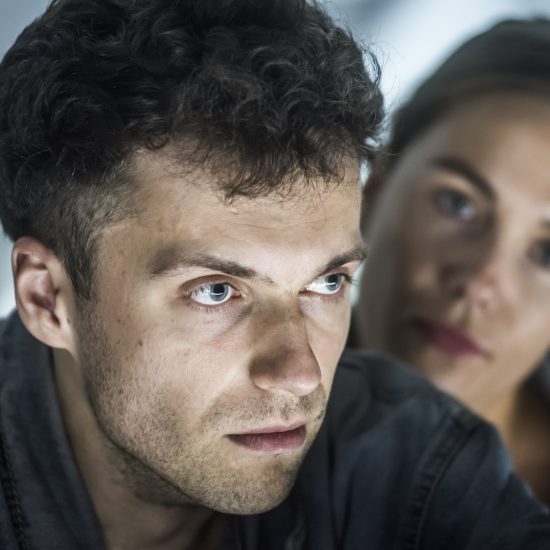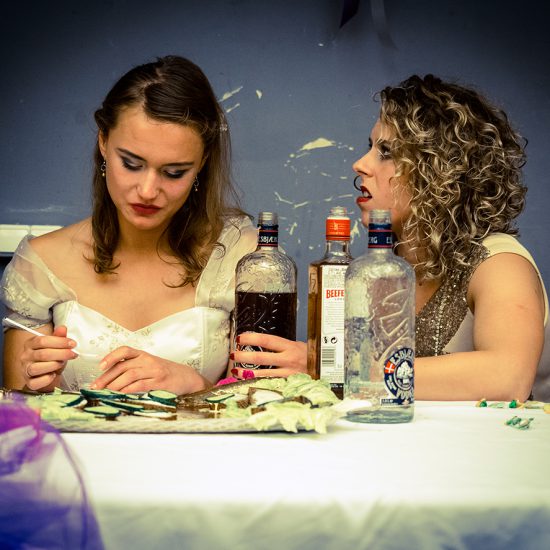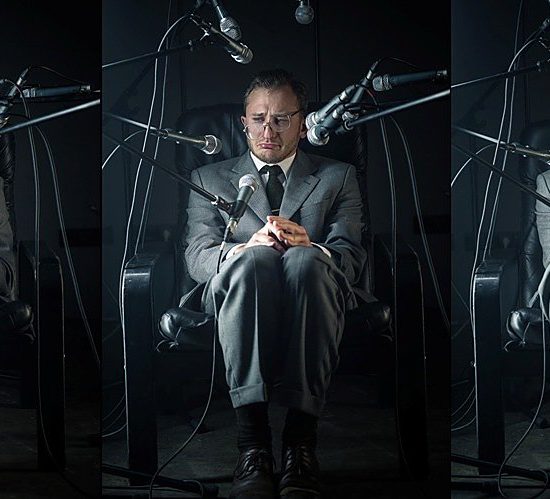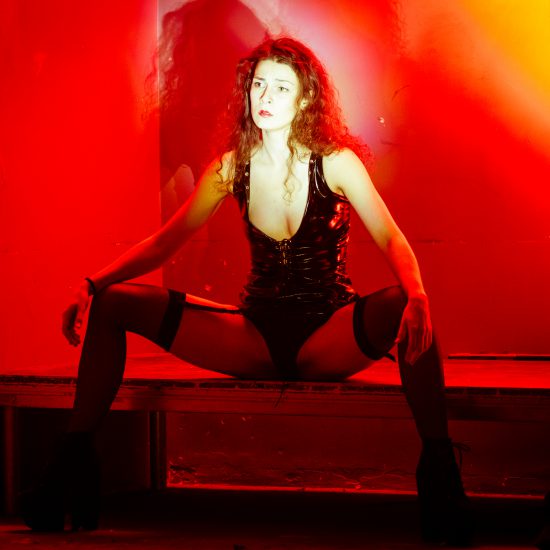Looking for time. Lost space
[…]
The performance will attempt to unlock time, and, by extension, itself – this is evidenced by details well thought out by the director’s team, such as a pocket watch, linked by a chain to the key of a tin box. Inside the box – a banana – not much of a secret, really without the slightest poetic air. The search for time in the play is rather ironic, even absurd: the repetition of time frozen in the records is a return to where it is no longer possible return to and, at the same time, a move forward along the recurring cycle of experience. This repetition structures the rhythm of the play, as well as the word “spool” savoured by Krapp, denoting the chronological repetition as the reel keeps turning.
But in the beginning there is no tape, strictly speaking, there isn’t even a beginning as such. A desktop lamp turned towards the audience is the only source of light in a small dark room. From behind the audience, a man (J. Budraitis) walks to the space outlined as the stage. He’s wearing a long, heavy coat. Breathing heavily he collapses on a chair in front of the table, turns the lamp to himself dividing the flat space into two zones: the zone of acting and the zone of observation. The performance begins.
The space of the performance is curved – the centre is moved to the left side, because on the right there is a piece of the stage covered from the audience’s eyes with a black curtain. Yet most of the action takes place at a dimly lit table with books, paper, and tape recorder on it. Moreover, the space of the stage becomes somewhat extended when Krapp walks behind the audience and begins to noisily rummage through his old stuff, croaking loudly and drinking from a bottle. It seems the viewer becomes incorporated in the play, taking part in the illusion of an uncomfortable coexistence. However, the spatial fragmentation separation remains, as the actor moves among the audience in the centre of the room – the backstage, which was once at the front now is moved to the sides – the black spots which the play does not physically invade. Trying to outline the main character’s movement in your imagination, you become lost just as you become lost trying to identify your own status in this process: you are not fully an observer, since you do not have a seat in the stalls or loge, nor are you a participant, as you do not get involved in the action, perhaps even on the contrary, any contact with you as a spectator is avoided. The actor faces a difficult task: in the small room there is nothing to rest his desperate gaze on – the objects are scarce, and there are only viewers’ eyes in front of him, thus he turns his gaze towards himself.
Krapp’s old age like the time that has passed is captured not only on tapes, but also in his voice: the man croaks, munches, loudly pours his drink and loudly gulps it down – the vivid sounds of human existence envelop the viewer. Sometimes the physiology of sounds seems way too graphic to the point that the sound seems to be playing itself.
[…]
The character of J. Budraitis reacts to what he is hearing: repeats words with his lips, fidgets in his chair, wrings his hands and drums his fingers. It is the relationship with himself in a different time – with himself a long time ago when he didn’t know the things he would experience later in time, when his voice was full of life, vibration, and excitement. Comparing the voice on the tapes and on the stage, it is impossible not to admire the wide range of the actor’s articulation and intonations: from excited thrill in his voice to a croaky voice of a sick old man. […]
S. Beckett’s play is ironic and cold – this is probably due to the very nature of writing, which, being motionless, possesses the ability to trigger the reader’s internal experience. It is a challenging task to stage such a play, because of the necessity to convey inner experiences to the outer world. In O. Koršunovas’ staging the play gains warmth, especially at the end when a lyrical melody carries us away from the awkward atmosphere of squeaky voices and boxes, like in the Greek catharsis. Although we can feel the absurd in this play, O. Koršunovas prefers the principle of the final resolution of a tragedy – with relief, enlightenment, and thoughtful insight. Apparently the search for lost time can be different for different people – ironic for some people and sad for others.



